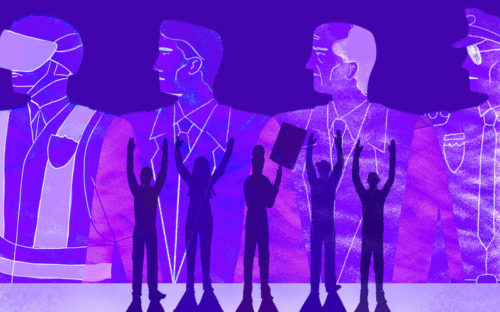When Civility Is Used As A Cudgel Against People Of Color
Share
Explore Our Galleries
Breaking News!
Today's news and culture by Black and other reporters in the Black and mainstream media.
Ways to Support ABHM?
By Karen Grigsby Bates, NPR.org

The value of civility is one of the few things Americans can all agree on — right? That’s the common assumption. And yet it’s an assumption that depends on everyone thinking they’re a full member of the community.
But what about when they aren’t?
For many people of color in the United States, civility isn’t so much social lubricant as it is a vehicle for containing them, preventing social mobility and preserving the status quo. The furious white pushback at integrating lunch counters in the 1960s wasn’t about the grilled cheese sandwiches that sit-in protesters weren’t going to be served — it was about their presumption that they could sit at the counter at all. As equals.
That fury is why Alabama Gov. George Wallace could proclaim, “Segregation now, segregation tomorrow and segregation forever!”
Even after passage of the Civil Rights Act and the Voting Rights Act, some white people were still pushing back against demands for equality from black and brown communities. James Forman, a principal organizer with the Student Nonviolent Coordinating Committee, had famously promised the people who wanted to go slow on integration that if blacks didn’t have a seat at democracy’s table soon, the entire table would be tossed.
A few years later, as the Black Power movement gathered steam, activist H. Rap Brown told black Americans that they could ignore laws that were never meant to include them. “We did not make the laws in this country,” he insisted. “We are neither morally or legally confined to those laws. Those laws that keep them up keep us down!”
A “God-ordained” right to civilize others
Such laws and ordinances were designed to contain communities of color, says Gaye Theresa Johnson, who studies the intersection of civility and race at the University of California, Los Angeles. They allowed white citizens to, in effect, civilize people they considered less than.
And many assumed that this civilizing mission came from a higher authority. “It’s always been a situation where people assume that civility is something that’s sort of God ordained,” Johnson says.
That belief would indicate that some people are innately civil, while others need to have civility taught to — or imposed upon — them. Johnson says this is part of the underlying rationale for the enslavement of Africans imported into America and the genocide of Native peoples.
“People of color don’t get to orchestrate the terms of civility,” she explains. “Instead, we’re always responding to what civility is supposed to be…”
More Breaking News here
View more ABHM galleries here









Comments Are Welcome
Note: We moderate submissions in order to create a space for meaningful dialogue, a space where museum visitors – adults and youth –– can exchange informed, thoughtful, and relevant comments that add value to our exhibits.
Racial slurs, personal attacks, obscenity, profanity, and SHOUTING do not meet the above standard. Such comments are posted in the exhibit Hateful Speech. Commercial promotions, impersonations, and incoherent comments likewise fail to meet our goals, so will not be posted. Submissions longer than 120 words will be shortened.
See our full Comments Policy here.